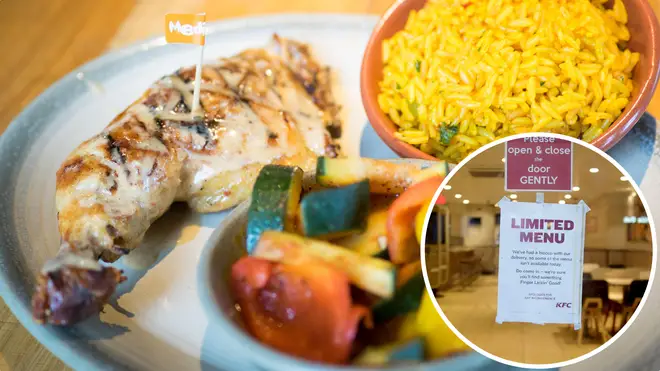
Clive Bull 1am - 4am
19 August 2021, 09:18

A shortage of chicken, which forced restaurants like Nando's and KFC to close or change their menu, is being blamed on Brexit.
The head of the British Poultry Council said shortages of workers are causing issues and called on the government to fast-track visas for people coming to work in the industry.
Richard Griffiths, chief executive of the British Poultry Council, also blamed worker shortages following Brexit for the issues the industry is currently facing.
Read more: Nando's temporarily closes restaurants across UK after running out of chicken
"When you don't have people, you have a problem - and this is something we are seeing across the whole supply chain. The labour crisis is a Brexit issue," Mr Griffiths said.
Nando's said: "The UK supply chain is having a bit of a 'mare' right now.
"This is having a knock-on effect with some of our restaurants across England, Scotland and Wales.
"We are doing everything we can to get the peri-peri back where it belongs - on your plates!"
Ministers say they're looking at ways to help the sector recruit more domestic labour.
The chicken shortage, comes after rival restaurant KFC also reported supply issues.
The UK supply chain is having a bit of a ‘mare right now. This is having a knock-on effect with some of our restaurants across England, Scotland and Wales. We are doing everything we can to get the PERi-PERi back where it belongs – on your plates!
— Nando's (@NandosUK) August 17, 2021
Mr Griffiths warned that many members of his association were being forced to "cut back weekly chicken production by 5-10%, year-round turkey production by 10% and Christmas turkey production to be cut by 20%."
He added his members "are currently producing a reduced range of products for UK customers and are seriously concerned that the supply of staple chicken products will be impacted."
Adding this was caused by "labour shortages," he warned, "UK food security will be hit with a double whammy of food inflation and being forced to rely on more imported food."
"This can only lead to a 2-tier food system where high-quality British food may be out of reach for struggling consumers,” he warned.